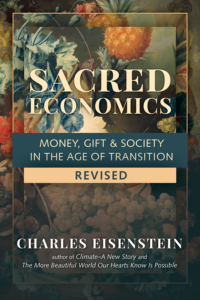The More Beautiful World Our Hearts Know Is Possible
Chapters
Chapter 15: Orthodoxy
That is at bottom the only courage that is demanded of us: to have courage for the most strange, the most singular and the most inexplicable that we may encounter. That mankind has in this sense been cowardly has done life endless harm; the experiences that are called “visions,” the whole so-called “spirit-world,” death, all those things that are so closely akin to us, have by daily parrying been so crowded out of life that the senses with which we could have grasped them are atrophied.
—Rilke
The convergence of spirituality and activism mirrors a broader reunion of spirit and matter, in which we understand the two realms as one. This is different from the claim of science to have explained away any phenomenon we might call spiritual. More than a reduction of spirit to matter, it is an elevation of matter to spirit.
This reunion is still incomplete. There are still many political activists who will be appalled at this book’s reference to phenomena that they label as “scientifically unproven” or causal principles they label as unscientific. They do not realize that scientific orthodoxy is cut from the same cloth and serves the same ends as the rest of our dominant institutions. It contributes to the maintenance of the Story of Separation just as much as economics, politics, or organized religion.
Similarly, readers who are knowledgeable about alternative scientific paradigms and technologies may be feeling impatient with my skepticism of the idea that these will save humanity. Although I have firsthand experience with several technologies that conventional science calls impossible, I will not promote them in this book. The reason is, again, if these are to save us, then why haven’t they already? Many have been known and suppressed for decades. I have read the literature alleging that this suppression is conscious and systematic; I think it is mostly, rather, unconscious and systemic. Through a thousand mechanisms, we have suppressed them because they do not fit into our mythology and identity. Equivalently, one might say, we were not ready for them. We were not ready for technologies that were distributed rather than centralized, that released control from the experts to the people, and that necessitated seeing the interconnectedness of all things. Symptomatic of our unreadiness is inventors’ rush to patent each new miracle device, attempting to contain something of the new story within the structures of the old. Perhaps these technologies of abundance—of energy, health, time, and life—will leave the margins and take hold only when we, collectively, exemplify abundance ourselves through generosity, service, surrender, and trust.
We are on the brink of a wholesale metamorphosis. We will never embrace the technologies of interbeing from the mentality of Separation. These technologies are not a magic bullet, though I do think, in the end, they will indeed be part of our healing. But a shift in our perceptions, in our worldview, comes first. At the present juncture, the primary importance of the technologies of interbeing isn’t in what they can do. It is that they puncture the reality bubble in which we have lived, showing us that neither we nor the world is what we thought. Their significance is the same as that of any paradigm-busting phenomenon.
Now it is easy to believe, when surveying the widespread denial of climate science in my country, that the problem is unscientific attitudes. If only we would listen to the scientists! Unfortunately, the same exhortation is also deployed in the context of genetic engineering of crops, nuclear power, and other questionable technologies that I hesitate to mention lest I too be tarred with the very wide brush of “antiscience.” While the two examples above don’t enjoy anything like the unanimity that anthropogenic climate change does, advocates like Michael Specter do not hesitate to brand opponents as unscientific. All the more unscientific would they consider my beliefs about holistic medicine, qigong, biodynamic agriculture, water memory, biological nuclear chemistry, crop circles, psi phenomena, over-unity devices, radioactive waste remediation, and Santa Claus. There, I’ve let the cat out of the bag.
Because of their power to puncture the old story, I encourage people to explore these “unscientific” phenomena. You will discover that they provoke a combination of upliftment and scorn. They relieve the weight of Separation and validate our childlike perceptions of untapped wonders, mysteries, and possibilities. At the same time, they trigger the fear that these perceptions are delusions, and thus the derision of the cynic discussed earlier.
Don’t worry—I’m not going to pin my optimism on the hope that some miracle technology is going to save us. If it were up to technology to save us, it already would have. We have long possessed the technologies to live abundantly and sustainably on this planet, but we have used them to other ends. We could live in an earthly paradise using perfectly uncontroversial technologies: conservation, recycling, green design, solar energy, permaculture, biological wastewater treatment, bicycles, designing for reparability, durability, and reusability, and so on. These are technologies that already exist and, by and large, have existed for decades or centuries. No new, miraculous technologies are necessary. However, another kind of miracle is necessary to redeem the promise of these existing technologies: a social or political miracle. That’s what it would take to reverse deforestation, cut greenhouse gas emissions, heal damaged watersheds, and remove all the legal, social, and economic impediments to change. It would doubtless require a different money system, and therefore a radical restructuring of economic power and privilege. It would require a wholesale shift away from militarism and all the belief systems behind it. It would require millions of people going back to the land to engage in small-scale, high-productivity, labor-intensive agriculture. Technologically feasible? Certainly. Politically realistic? Hardly.
There is no doubt that one way or another, we are facing a task that we don’t know how to accomplish. Any politically realistic proposal today pales into insignificance beside the severity of the crisis at hand. Herein lies the significance of the unorthodox and heterodox technologies that I mentioned before: The worldview that eliminates such things from the realm of possibility also cuts us off from the kinds of actions that are necessary to change the world. In both cases, we face something that cannot happen without violating our Story of the World.
Even though science as we know it is central to the centuries-long or millennia-long program to master nature, even though its approach to gathering knowledge is the very model of “othering” nature and making the world into an object, scientifically oriented people are often fervent environmentalists and supporters of civil rights, equality for gay people, and other compassionate positions. This exemplifies a general principle: our entry into the new story is uneven. In one area of life or thought we may have transcended all vestiges of separation, while being completely blind to it in another. It never ceases to amaze me. Someone might have deep insight into the institutions, both internal and external, of racism, sexism, classism, and colonialism, but have no clue that Western medicine, and to some extent science itself, are among those institutions. I go to a traditional nutrition conference where people thoroughly understand the corruption of our food system, how it destroys land, health, and community, but they are unaware that the school system does much the same. Citing studies that link diet and test scores, they say, “If only children had better nutrition, we would improve school performance,” assuming that paying attention in class and doing well on tests are signs of a healthy child. But when we become aware of how the school system is a conditioning agent to instill in children obedience to authority, passivity, and tolerance to tedium for the sake of external rewards, we begin to question school performance as a metric of well-being. Maybe a healthy child is one who resists schooling and standardization, not one who excels at it. Then I go to an educational conference where people do understand that, yet (judging by the food consumed and the health of the participants) have little connection to their bodies or awareness that the food system is just as corrupt as the educational system. And almost anywhere I go, no matter how radical the audience when discussing agriculture or education or sexuality or politics, when push comes to shove concerning their health, they go to a conventional MD.
For a long time, activists in these areas and many others have been operating in their own silos, as if they were addressing a single anomalous malady in a system that, despite a few problems, were fundamentally sound. It was not obvious that someone working for, say, prison reform was devoted to another facet of the same cause as someone working for organic agriculture. Fortunately, this is changing today. A creeping radicalization is taking over, as people recognize the interconnectedness of all our systems and institutions, and the complicity of these in upholding the dominant narratives. The prison system as we know it depends on the same kinds of beliefs that also embed our food system, educational system, and medical system. They all depend on the same political mindsets, the same economic mechanisms, and the same kinds of interpersonal relationships.
They also come from (and contribute to) the same psychology or, one might say, the same state of being. That is why the creeping radicalization I speak of ultimately extends to the spiritual domain as well, by which, again, I mean not something otherworldly, but that which involves the fundamental questions of “Who am I?” “What is the purpose of life?” and so on.
More and more people are entering multidimensionally now into the new story. They are building alliances across previously disconnected areas of activism, and they are entering realms of inquiry that were once the exclusive province of spiritual seekers. They are also striving to apply their discoveries to their own organizations and relationships. No domain of life is irrelevant to the transformation of our world.
There has probably been something in this chapter to tweak nearly everyone. When things fall apart, we look for a redoubt, some familiar institution that we can rely on as a repository of goodness and truth. In this age, there is none: not science, not education, not medicine, not academia. Even our spirituality, as we have seen, is rife with the thought forms of Separation.
It is quite natural to react defensively to the falling apart of the world, to cling to it all the more tightly. If you react emotionally to my aspersions on one of your sacred cows, it probably means that something beyond mere opinion is threatened. Perhaps you disagree with me about the efficacy of acupuncture or the authenticity of crop circles. Is it just an intellectual disagreement, or are you a little bit angry? What emotionally tinged judgments accompany the disagreement? That I am a simpleminded dupe? That I am ignorant of basic science? That I have neglected to examine contrary evidence that would spoil my wishful thinking? That my beliefs are outrageous, contemptible, or shameful? Do you justify the contempt with reasoning like “These beliefs give people false hope and distract them from solutions that might actually work”? If so, is that really why you are mad, or is it something else? I have found that when I react emotionally to an idea that contradicts my beliefs, usually it is because it threatens my story of the world or my story of self, creating a kind of existential unease. I feel a sense of violation.
None of this is to imply that if you respond emotionally to my unconventional statements, you are proved wrong and I am proved right. All it implies is that your rejection has little to do with evidence or logic. Evidence and logic are tools we use to justify and flesh out our beliefs, but we are deceiving ourselves to think that they are the source of our beliefs. I will return to this idea, because it is crucial to understanding the process of belief change as well; and clearly, for our world to have a chance of surviving, a lot of beliefs are going to have to change.
Endnotes:
12. I should mention here that just as organized religion harbors an esoteric core that does not teach separation, so also we might distinguish between science as an institution, and the Scientific Method itself. While it can be argued that even the Scientific Method is fraught with unexamined assumptions (for example, objectivity: that a hypothesis about reality doesn’t alter that reality, and that it is in principle to repeat experiments because the variables of time, place, and the experimenter are independent of the hypothesis being tested), ultimately it encodes a kind of humility, a willingness to change or expand beliefs in response to information coming from outside one’s conscious self.
13. See my article Synchronicity, Myth, and the New World Order for further thoughts on the dynamic of unconscious conspiracies.
14. I purposely left out wind energy here, because I have serious environmental concerns about it as currently implemented, though unorthodox smaller-scale designs show some promise. Ultimately, the solution is not to produce more power in order to sustain our present society. It is to change our society into one that, among other things, uses less power. Most of the ways we use energy don’t foster well-being anyway.






